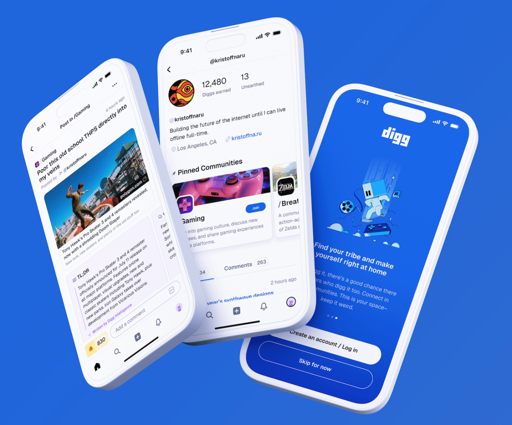Here's your first look at the rebooted Digg | TechCrunch
-
This post did not contain any content.
Worthless crap. Thank fuck we're on a platform free of centralised ownership.
-
Idk, its less subjective than the top comment summaries on reddit from users

I see no reason to engage with, or trust anything created by, a bullshit generator. If Digg claims to "care" about the humans, then making the top comment into a brick wall (which has zero accountability) is a funny way of showing it.
But then again, I'm sure their privacy policy also says they care about your privacy.
-
This post did not contain any content.
Maybe if they allow API access for alternative frontends that eliminate ads and block telemetry. Otherwise, not interested.
-
This post did not contain any content.
let me guess it's ai slop
-
This post did not contain any content.
I'm looking forward to the "Here's your first look at the rebooted Reddit" articles in 7 years.
-
Idk, its less subjective than the top comment summaries on reddit from users

Is there some reason we want brands to join the conversation?
-
yeah it doesnt look bad at all, thatll prob come later, the ai in use right now are a nonissue imo
I see many issues, including following Google's lead in building a zero-click internet for the uncurious
-
this would-be Reddit competitor, built for the AI era
Oh no...
The founders think that the internet is being flooded with bots and AI agents, which will create demand for online communities like Digg that foster real human connections.
Okay, Digg has my cautious attention...
Beneath posts, Digg is leveraging AI to summarize the article’s content.
And they lost me.
Because if there's anything a link aggregator needs, it's MORE reasons for people to not read linked articles! Will they also add AI responses? That way users wouldn't need to bother with reading OR writing!
-
Is there some reason we want brands to join the conversation?
They
 foster
foster real
real human
human connections.
connections. -
this would-be Reddit competitor, built for the AI era
Oh no...
The founders think that the internet is being flooded with bots and AI agents, which will create demand for online communities like Digg that foster real human connections.
Okay, Digg has my cautious attention...
Beneath posts, Digg is leveraging AI to summarize the article’s content.
And they lost me.
It must be tiring to be this narrow-minded.
-
I see no reason to engage with, or trust anything created by, a bullshit generator. If Digg claims to "care" about the humans, then making the top comment into a brick wall (which has zero accountability) is a funny way of showing it.
But then again, I'm sure their privacy policy also says they care about your privacy.
its not a comment its in the post and its alpha, they'll prob add an option for it to be closed by default.
-
I see many issues, including following Google's lead in building a zero-click internet for the uncurious
True, but its a tiny summary one sentence, im less likely to click the link when I see the fat human written summary at the top of reddit comments
-
this would-be Reddit competitor, built for the AI era
Oh no...
The founders think that the internet is being flooded with bots and AI agents, which will create demand for online communities like Digg that foster real human connections.
Okay, Digg has my cautious attention...
Beneath posts, Digg is leveraging AI to summarize the article’s content.
And they lost me.
What's wrong with AI summaries? AI has it's uses. A long as it's just adding some metadata I don't see nothing wrong with it.
For me the big questions is what are they going to do to stop bots, spam and internet points farming. So far they didn't reveal any plans.
-
this would-be Reddit competitor, built for the AI era
Oh no...
The founders think that the internet is being flooded with bots and AI agents, which will create demand for online communities like Digg that foster real human connections.
Okay, Digg has my cautious attention...
Beneath posts, Digg is leveraging AI to summarize the article’s content.
And they lost me.
AI. BOTS. MILLENIAL INFANTILE DESIGN. CORPORATE SPEAK.
Gee, I wonder why people aren't tripping over themselves to join this.
-
This post did not contain any content.
concepts that have been whipped up in Photoshop aren't "first looks"
-
This post did not contain any content.
The hero no one wanted, or needed
But other than that. Cool
-
this would-be Reddit competitor, built for the AI era
Oh no...
The founders think that the internet is being flooded with bots and AI agents, which will create demand for online communities like Digg that foster real human connections.
Okay, Digg has my cautious attention...
Beneath posts, Digg is leveraging AI to summarize the article’s content.
And they lost me.
The internet has way too many AI bots, let's add some more
- Digg logic
-
What's wrong with AI summaries? AI has it's uses. A long as it's just adding some metadata I don't see nothing wrong with it.
For me the big questions is what are they going to do to stop bots, spam and internet points farming. So far they didn't reveal any plans.
What's wrong with AI summaries?
It never stops there though, they never just write their summary and leave it alone they always have to have the AI do more and more until it eventually takes over the entire platform.




